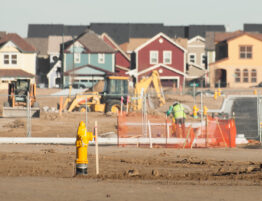
A leading figure in building control for England and Wales has warned that a new requirement for inspectors to register with a new Building Safety Regulator is leading to an impending breakdown in the system.
That means, from 6th April, there could be a number of local authorities where the building controls service that oversees safe and compliant construction is much reduced or ceases to operate altogether. Find out more in this week’s blog.
Dire warnings about new inspector requirements
From 6th April this year, all building-control professionals must have passed a new competence assessment and be registered with the Building Safety Regulator, which is part of the Health and Safety Executive (HSE).
However, the Chief Executive of the Local Authority Building Control (LABC), Lorna Stimpson, is warning that the profession hasn’t been given enough time to process this change and that’s about to cause a something close to breakdown.
Writing to senior officials at the UK and Welsh governments and the Health and Safety Executive, Stimpson warns of the wide ranging impacts on the construction industry, consumers, regulatory enforcement and compliance.
In the letter, she states:
“Our legal advice indicates that, without appropriate registered professionals, local authorities will cease to be able to undertake a building control function post 6 April. Current data indicates that there are a significant number of authorities in England and Wales that will be in this position. Local authorities may be unable to perform their statutory duties as described in the Building Act 1984.”
What she’s describing is a situation where many councils would be unable to inspect live construction projects, serve stop or compliance notices or award certain certificates, leaving some work unregulated.
Not enough time
While the first independent assessors for the new system were announced last July (the Building Safety Competence Foundation and the Chartered Association of Building Engineers) and then a third agency was added (Total Training & Development Ltd), the Building Safety Register itself only opened last October.
Stimpson says this timetable hasn’t given the profession long enough to understand the new requirements and that, as things stand many surveyors still haven’t applied to the register or signed up for the necessary competence testing. She said:
“LABC is undertaking an urgent review of the position of all local authorities in England and Wales to determine their position with regards to the number of surveyors likely to be certified and registered prior to the deadline –the picture does not currently look encouraging.”
Exodus causing concerns about capacity
Stimpson added that, within the profession, the 6th April deadline was leading to some extreme impacts on people’s mental health and that this was causing people to leave (making the shortfall in inspectors even worse).
“We have already started to see an exodus from the profession of the vital expertise that we need in the coming months as part of the new regime – this in itself is adding to already-increased workloads for a severely limited number of building-control professionals. We are hearing worrying reports of individuals in crisis, suffering extreme stress, anxiety and depression.”
Calls for a delay
Given these impacts and with limited time left, the LABC has urged ministers to push back the deadline for competence assessment by at least six months. Their proposal is for building surveyors to make a commitment to the BSR’s codes of conduct from 6 April but for there to be a later date by which they will need to be registered and working towards certification.
RIBA President, Muyiwa Oki, agrees:
“Following the Grenfell Tower tragedy, trust in the quality and safety of buildings has been at the heart of both the government and construction industry’s work. Both have invested a great deal of time and effort on the new building control system being introduced. To restore trust, it is vital that the new system works effectively.
“Having adequate capacity in local authority building control services is a key component of that success, and the concerns raised by LABC need to be heeded. An extension in the deadline for competence assessment may be necessary to ensure the new system is effective, sustainable and delivers safer buildings.”
A UK government spokesperson commented:
“It is crucial that the construction sector continues to undertake the validation and registration processes in order to meet the competence requirements set by the Building Safety Regulator.
“We understand that transitioning into a new oversight regime for building control inspectors requires a managed transition, and the regulator is closely engaging the sector to agree a way forward.”
What do you think?
What are your thoughts on the potential impact of these new regulations? Share your comments on our Facebook or LinkedIn pages.
13.03.2024
Feature image: Freepik. This image is not representative of anyone featured in this article.








